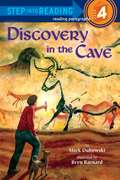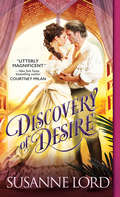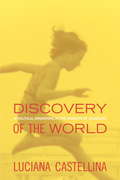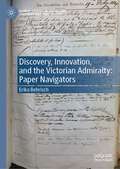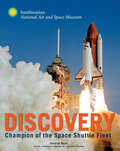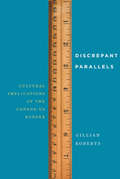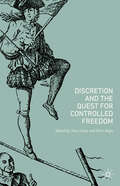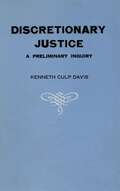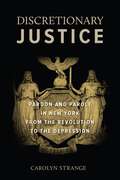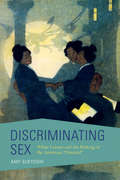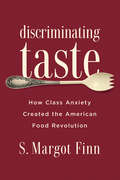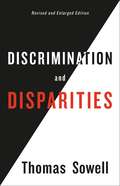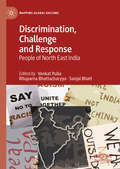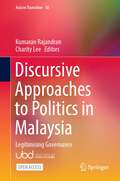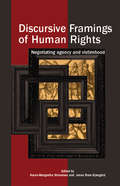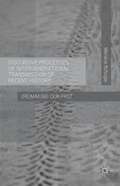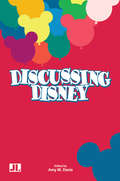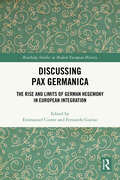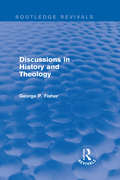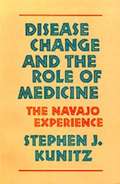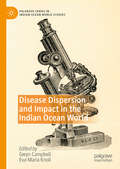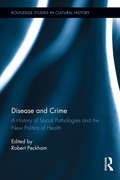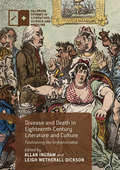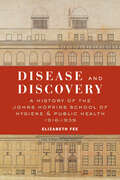- Table View
- List View
Discovery in the Cave (Step into Reading)
by Mark Dubowski Bryn BarnardThis amazing true adventure story about the discovery of the Lascaux Cave will have young readers feeling that they've discovered something pretty special, too! In 1940, four teenage boys and a dog dropped themselves into a hole in the forest floor. Using a flaming grease gun as a torch, they ventured deep underground, eventually coming to a huge cave, the walls of which were covered with life-size paintings of animals. Whole herds of horses! Deer with horns as big as tree branches! Giant bison! The boys were amazed by their discovery. They'd stumbled upon the world's finest examples of prehistoric painting! Perfect for classroom use, this Step 4 Step into Reading book is realistically illustrated by award-winning artist Bryn Barnard.From the Trade Paperback edition.
Discovery of Desire
by Susanne Lord"Beautifully written, deeply romantic, and utterly magnificent." --Courtney Milan, New York Times bestselling authorThe one man who's not looking for a wifeSeth Mayhew is the ideal explorer: fearless, profitable, and unmarried. There is nothing and no one he can't find-until his sister disappears en route to India. His search for her takes him to Bombay, where Seth meets the most unlikely of allies-a vulnerable woman who's about to marry the wrong man.Discovers a woman who changes his dreams foreverTeeming with the bounty of marriageable men employed by the East India Company, Bombay holds hope for security for Wilhelmina Adams. But when the man she's traveled halfway around the world to marry doesn't suit, Mina finds instead that she's falling in love with a man who offers passion, adventure, intimacy-anything but security..."Powerful and poignant." -RT Book Reviews, 4 ½ stars for In Search of Scandal
Discovery of the World
by Luciana CastellinaLuciana Castellina is one of Italy's most prominent left intellectuals and a cofounder of the newspaper il manifesto. In this coming-of agememoir, based on her diaries, she recounts her political awakening as a teenage girl in Fascist Italy--where she used to play tennis with Mussolini's daughter--and the subsequent downfall of the regime. Discovery of the World is about war, anti-Semitism, anti-fascism, resistance, the belief in social justice, the craving for experience, travel, political rallies, cinema, French intellectuals and FIAT workers, international diplomacy and friendship. All this is built on an intricate web made of reason and affection, of rational questioning and ironic self-narration as well as of profound nostalgia, disappointment and discovery.From the Hardcover edition.
Discovery, Innovation, and the Victorian Admiralty: Paper Navigators (Global Studies in Social and Cultural Maritime History)
by Erika BehrischThis book examines the British Admiralty’s engagement with science and technological innovation in the nineteenth century. It is a book about people, and gross misunderstanding, about the dreams and disappointments of scientific workers and inventors in relation to the administrators who adjudicated their requests for support, and about the power of paper to escalate arguments, reduce opinions, and frustrate hopes. From instructions for naval surveying to debates about rewards to civilians for inventions, Paper Navigators puts a wide range of primary sources in the context of public debates and explores the British Admiralty’s engagement with, decision-making around, and management of questions of value, support, and funding with citizen inventors, the broader public, and their own employees. Concentrating on the Admiralty’s private, internal correspondence to explore these themes, it offers a fresh perspective on the Victorian Navy's history of innovation and exploration and is a novel addition to literature on the history of science in the nineteenth century.
Discovery: Champion of the Space Shuttle Fleet
by Valerie NealThis book places Space Shuttle Discovery within the history of the space shuttle program and provides an introduction to space shuttle technology, with a focus on the orbiter itself. Discovery's unique history is presented mission by mission that includes a brief narrative of each mission, a chart of its key statistics (dates, duration, altitude, payloads, etc.), each mission's patch with an explanation of its unique symbolism, a crew portrait, and two to four iconic photos that capture the distinct activities and successes of each mission. The book also features anecdotes and memories of several astronauts who flew on Discovery, as well as its modernization over the years and its final preparation for retirement at the Smithsonian.
Discrepant Parallels
by Gillian RobertsThe 49th parallel has long held a symbolic importance to Canadian cultural nationalists as a strong, though permeable, border. But in contemporary Canadian culture, the border has multiple meanings, and imbalances of cultural power occur both across the Canada-US border as well as within Canada. Discrepant Parallels examines divergent relationships to, and investments in, the Canada-US border in a variety of media, such as travel writing, fiction, poetry, drama, and television. Tracing cultural production in Canada since the 1980s through the periods of FTA and NAFTA negotiations, and into the current, post-9/11 context, Gillian Roberts grapples with the border's changing relevance to Canadian nationalist, Indigenous, African Canadian, and Latin American perspectives. Drawing on Kant and Derrida, she theorizes the 49th parallel to account for the imbalance of cultural, political, and economic power between the two countries, as well as the current challenges to dominant definitions of Canadianness. Focusing on a border that is often overshadowed by the contentious US-Mexico divide, Discrepant Parallels analyzes the desire to establish Canadian-American sameness and difference from a multitude of perspectives, as well as its implications for how Canada is represented within and outside its national borders.
Discretion and the Quest for Controlled Freedom
by Tony Evans Peter HupeLooking at discretion broadly as the exercise of controlled freedom, this edited volume introduces insights from a range of social sciences perspectives. Traditionally, discussions of discretion have drawn on legal notions of the appropriate exercise of legitimate authority specified by legislators. However, empirical and theoretical studies in the social sciences have extended our understanding of discretion, moving us beyond a narrow legal view. Contributors from a range of disciplines explore the idea of discretion and related notions of freedom and control across social and political practices and in different contexts. As this complex and important topic is discussed and examined, both total control and unconstrained freedom appear to be illusions.
Discretionary Justice: A Preliminary Inquiry (Walter Lynwood Fleming Lectures In Southern History Ser.)
by Kenneth Culp Davis"The book is a carefully considered, ably articulated, and closely reasoned call for a redirection of attention, thought, and research. This is why it is a pioneering and significant contribution to the literature of law, jurisprudence, public administration, and political science."--Virginia Quarterly Review
Discretionary Justice: Pardon and Parole in New York from the Revolution to the Depression
by Carolyn StrangeThe pardon is an act of mercy, tied to the divine right of kings. Why did New York retain this mode of discretionary justice after the Revolution? And how did governors’ use of this prerogative change with the advent of the penitentiary and the introduction of parole? This book answers these questions by mining previously unexplored evidence held in official pardon registers, clemency files, prisoner aid association reports and parole records. This is the first book to analyze the histories of mercy and parole through the same lens, as related but distinct forms of discretionary decision-making. It draws on governors’ public papers and private correspondence to probe their approach to clemency, and it uses qualitative and quantitative methods to profile petitions for mercy, highlighting controversial cases that stirred public debate. Political pressure to render the use of discretion more certain and less personal grew stronger over the nineteenth century, peaking during constitutional conventionsand reaching its height in the Progressive Era. Yet, New York’s legislators left the power to pardon in the governor’s hands, where it remains today. Unlike previous works that portray parole as the successor to the pardon, this book shows that reliance upon and faith in discretion has proven remarkably resilient, even in the state that led the world toward penal modernity.
Discriminating Sex: White Leisure and the Making of the American "Oriental" (Asian American Experience)
by Amy SueyoshiFreewheeling sexuality and gender experimentation defined the social and moral landscape of 1890s San Francisco. Middle class whites crafting titillating narratives on topics such as high divorce rates, mannish women, and extramarital sex centered Chinese and Japanese immigrants in particular. Amy Sueyoshi draws on everything from newspapers to felony case files to oral histories in order to examine how whites' pursuit of gender and sexual fulfillment gave rise to racial caricatures. As she reveals, white reporters, writers, artists, and others conflated Chinese and Japanese, previously seen as two races, into one. There emerged the Oriental--a single pan-Asian American stereotype weighted with sexual and gender meaning. Sueyoshi bridges feminist, queer, and ethnic studies to show how the white quest to forge new frontiers in gender and sexual freedom reinforced--and spawned--racial inequality through the ever evolving Oriental. Informed and fascinating, Discriminating Sex reconsiders the origins and expression of racial stereotyping in an American city.
Discriminating Taste: How Class Anxiety Created the American Food Revolution
by S. Margot FinnFor the past four decades, increasing numbers of Americans have started paying greater attention to the food they eat, buying organic vegetables, drinking fine wines, and seeking out exotic cuisines. Yet they are often equally passionate about the items they refuse to eat: processed foods, generic brands, high-carb meals. While they may care deeply about issues like nutrition and sustainable agriculture, these discriminating diners also seek to differentiate themselves from the unrefined eater, the common person who lives on junk food.Discriminating Taste argues that the rise of gourmet, ethnic, diet, and organic foods must be understood in tandem with the ever-widening income inequality gap. Offering an illuminating historical perspective on our current food trends, S. Margot Finn draws numerous parallels with the Gilded Age of the late nineteenth century, an era infamous for its class divisions, when gourmet dinners, international cuisines, slimming diets, and pure foods first became fads. Examining a diverse set of cultural touchstones ranging from Ratatouille to The Biggest Loser, Finn identifies the key ways that “good food” has become conflated with high status. She also considers how these taste hierarchies serve as a distraction, leading middle-class professionals to focus on small acts of glamorous and virtuous consumption while ignoring their class’s larger economic stagnation. A provocative look at the ideology of contemporary food culture, Discriminating Taste teaches us to question the maxim that you are what you eat.
Discrimination and Disparities
by Thomas SowellAn enlarged edition of Thomas Sowell's brilliant examination of the origins of economic disparitiesEconomic and other outcomes differ vastly among individuals, groups, and nations. Many explanations have been offered for the differences. Some believe that those with less fortunate outcomes are victims of genetics. Others believe that those who are less fortunate are victims of the more fortunate.Discrimination and Disparities gathers a wide array of empirical evidence to challenge the idea that different economic outcomes can be explained by any one factor, be it discrimination, exploitation, or genetics. This revised and enlarged edition also analyzes the human consequences of the prevailing social vision of these disparities and the policies based on that vision--from educational disasters to widespread crime and violence.
Discrimination, Challenge and Response: People of North East India (Mapping Global Racisms)
by Venkat Pulla Rituparna Bhattacharyya Sanjai BhattThis book explores discrimination against Northeast Indians, who have been frequently stereotyped as backwards, anti-national, anti-assimilationist, immoral, and relegated to low paying positions across retail, hospitality, telecommunications and wellness industries. The contributions draw on interviews with individuals who have migrated to other Indian cities and towns to find jobs and escape from native poverty, and provide a critical examination of the intersections between power, privilege and racial hierarchy in India today. The chapters cover a variety of perspectives including social movements and activism, history, policy, youth studies and gender studies. With a focus on marginalised communities, and the effects and persistence of racial inequality in a South Asian context, this collection will be an important contribution to critical race studies, public policy, human rights discourse, and social work.
Discursive Approaches to Politics in Malaysia: Legitimising Governance (Asia in Transition #18)
by Kumaran Rajandran Charity LeeThis open access book examines Malaysian politics using a linguistic perspective. It explores how language serves to (de)legitimise governance, and its subsequent policies and activities in Malaysia. Grounded in discourse studies, this edited volume presents research on the discourses produced by and on Barisan Nasional, Pakatan Harapan and Perikatan Nasional from 2008 to 2020, studying how political actors (de)legitimise their governance through discursive means. The thirteen original chapters select spoken, print and digital texts in English, Malay, Mandarin and Tamil, and deploy varied theoretical and methodological approaches. Their linguistic analysis unearths the language features and strategies that facilitate (de)legitimation. It shows how political actors shape the discursive representation and evaluation of multiple concerns in Malaysia. Consequently, Discursive Approaches to Politics in Malaysia: Legitimising Governance improves our understanding of contemporary Malaysian political discourse. It is of interest to graduates and researchers in the field of discourse studies, seeking to understand the discursive contours of politics in this developing Asian country.
Discursive Framings of Human Rights: Negotiating Agency and Victimhood
by Karen-Margrethe Simonsen Jonas Ross KjaergardWhat does it mean to be a subject of human rights? The status of the subject is closely connected with the form and rhetoric of the framing discourse, and this book investigates the relationship between the status of the subject and the form of human rights discourse, in differing aesthetic and social contexts. Historical as well as contemporary declarations of rights have stressed both the protective and political aspects of human rights. But in concrete situations and conflictual moments, the high moral legitimacy of human rights rhetoric has often clouded the actual character of specific interventions, and so made it difficult to differentiate between the objects of humanitarian intervention and the subjects of politics. Critically re-examining this opposition – between victims and agents of human rights – through a focus on the ways in which discourses of rights are formed and circulated within and between political societies, this book elicits the fluidity of their relationship, and with it the shifting relation between human rights and humanitarianism. Analysing the symbolic framings of testimonies, disaster stories, atrocity tales, political speeches, and philosophical arguments, it thus establishes a relationship between these different genres and the political, economic, and legal dimensions of human rights discourse.
Discursive Processes of Intergenerational Transmission of Recent History: (re)making Our Past
by Mariana AchugarDebates about how to remember politically contested or painful pasts exist throughout the world. As with the case of the Holocaust in Europe and Apartheid in South Africa, South American countries are struggling with the legacy of state terrorism left by the 1970s dictatorships. Coming to terms with the past entails understanding the role different social actors played in those events as well as what those event mean for us today. Young people in these situations have to learn about painful historical events over which there is no national consensus. This book explores discursive processes of intergenerational transmission of recent history through the case of the Uruguayan dictatorship. The main themes of the book are the discursive construction of social memory and intergenerational transmission of contested pasts through recontextualization, resemiotization and intertextuality.
Discussing Disney
by Amy M. DavisThese scholarly essays examine Disney’s cultural impact from various perspectives—including film studies, history, musicology, gender and more.The academic field of Disney Studies has evolved greatly over the years, as the twelve essays collected in this volume demonstrate. With a diversity of perspectives and concerns, the contributors examine the cultural significance and impact of the Disney Company’s various outputs, such as animated shorts and films, theme park attractions, television shows, books, music, and merchandising. By looking at Disney from some of its many angles—including the history and the persona of its founder, a selection of its successful and not-so-successful films, its approaches to animation, its branding and fandom, and its reception and reinterpreted within popular culture—Discussing Disney offers a more holistic understanding of a company that has been, and continues to be, one of the most important forces in contemporary culture.
Discussing Pax Germanica: The Rise and Limits of German Hegemony in European Integration (Routledge Studies in Modern European History)
by Fernando Guirao Emmanuel ComteDiscussing Pax Germanica: The Rise and Limits of German Hegemony in European Integration examines and reconsiders Germany’s paramount role in shaping European integration from the aftermath of World War II to the present. This volume meticulously explores the ascendancy of Germany to a dominant position in European politics and economics. It critically engages with the concept of hegemony, delineating Germany’s influence on the development of the European Union and its resemblance to historical precedents in German history like the Holy Roman Empire. Methodologically, the book integrates archival research with contemporary literature to craft a narrative that is both historically grounded and relevant to current European affairs. The work stands out for its exploration of Germany’s strategic use of economic power and political diplomacy to shape the European Union according to its interests while facing inherent limitations and challenges, such as the eurozone crisis, migration policies, energy dependency, and foreign policy towards Russia. Targeting a diverse audience of both scholars and non-specialists, this book is particularly relevant for those interested in European politics, German history, and international relations.
Discussions in History and Theology (Routledge Revivals)
by George P. FisherFirst published in 1880, this is a fascinating collection of essays by the nineteenth-century theologian and historian George P. Fisher, arranged into three key classifications. The first group comprises papers that relate to the history, polity and dogmas of the Roman Catholic Church, with a particular focus on how the religion of ancient Rome reappears in the characteristic features of Latin Christianity. The second group of essays relates to the New England theology that was pioneered by Jonathan Edwards and entailed important modifications to the philosophy of Calvinism. Unitarianism is also discussed in detail, which is the subject of a paper on Channing, who was regarded as the most prominent representative of the movement in America. The third set of essays explores Theism and Christian evidences, with papers presenting analyses of rationalistic theory, Atheism, and the intellectual and spiritual career of the Apostle Paul. A fascinating and comprehensive collection, this important reissue will be of particular value to students interested in the interplay between history and Christian theology.
Disease Change and the Role of Medicine: The Navajo Experience
by Stephen J. Kunitz Charles M. LeslieStephen Kunitz's work raises crucial issues for public policy in the medical field, and will be valuable for social scientists, physicians, and health professionals concerned with the social context of public health and other medical facilities.
Disease Dispersion and Impact in the Indian Ocean World (Palgrave Series in Indian Ocean World Studies)
by Gwyn Campbell Eva-Maria KnollThis volume views the study of disease as essential to understanding the key historical developments underpinning the foundation of contemporary Indian Ocean World (IOW) societies. The interplay between disease and climatic conditions, natural and manmade crises and disasters, human migration and trade in the IOW reveals a wide range of perceptions about disease etiologies and epidemiologies, and debates over the origin, dispersion and impact of disease form a central focus in these essays. Incorporating a wide scope of academic and scientific angles including history, social and medical anthropology, archaeology, epidemiology and paleopathology, this collection focuses on diseases that spread across time, space and cultures. It scrutinizes disease as an object, and engages with the subjectivities of afflicted inhabitants of, and travellers to, the IOW.
Disease and Crime: A History of Social Pathologies and the New Politics of Health (Routledge Studies in Cultural History #23)
by Robert PeckhamDisease and crime are increasingly conflated in the contemporary world. News reports proclaim "epidemics" of crime, while politicians denounce terrorism as a lethal pathological threat. Recent years have even witnessed the development of a new subfield, "epidemiological criminology," which merges public health with criminal justice to provide analytical tools for criminal justice practitioners and health care professionals. Little attention, however, has been paid to the historical contexts of these disease and crime equations, or to the historical continuities and discontinuities between contemporary invocations of crime as disease and the emergence of criminology, epidemiology, and public health in the second half of the nineteenth century. When, how and why did this pathologization of crime and criminalization of disease come about? This volume addresses these critical questions, exploring the discursive construction of crime and disease across a range of geographical and historical settings.
Disease and Death in Eighteenth-Century Literature and Culture
by Allan Ingram Leigh Wetherall DicksonThis collection examines different aspects of attitudes towards disease and death in writing of the long eighteenth century. Taking three conditions as examples - ennui, sexual diseases and infectious diseases - as well as death itself, contributors explore the ways in which writing of the period placed them within a borderland between fashionability and unfashionability, relating them to current social fashions and trends. These essays also look at ways in which diseases were fashioned into bearing cultural, moral, religious and even political meaning. Works of literature are used as evidence, but also medical writings, personal correspondence and diaries. Diseases or conditions subject to scrutiny include syphilis, male impotence, plague, smallpox and consumption. Death, finally, is looked at both in terms of writers constructing meanings within death and of the fashioning of posthumous reputation.
Disease and Death in Eighteenth-Century Literature and Culture: Fashioning the Unfashionable (Palgrave Studies in Literature, Science and Medicine)
by Allan Ingram Leigh Wetherall DicksonThis collection examines different aspects of attitudes towards disease and death in writing of the long eighteenth century. Taking three conditions as examples – ennui, sexual diseases and infectious diseases – as well as death itself, contributors explore the ways in which writing of the period placed them within a borderland between fashionability and unfashionability, relating them to current social fashions and trends. These essays also look at ways in which diseases were fashioned into bearing cultural, moral, religious and even political meaning. Works of literature are used as evidence, but also medical writings, personal correspondence and diaries. Diseases or conditions subject to scrutiny include syphilis, male impotence, plague, smallpox and consumption. Death, finally, is looked at both in terms of writers constructing meanings within death and of the fashioning of posthumous reputation.
Disease and Discovery: A History of the Johns Hopkins School of Hygiene & Public Health, 1916–1939
by Elizabeth FeeThe story of a world-renowned institution and “a broad investigation of early twentieth-century public health ideology in America” (Journal of the American Medical Association).At the end of the nineteenth century, public health was the province of part-time political appointees and volunteer groups of every variety. Public health officers were usually physicians, but they could also be sanitary engineers, lawyers, or chemists—there was little agreement about the skills and knowledge necessary for practice. In Disease and Discovery, Elizabeth Fee examines the conflicting ideas about public health’s proper subject and scope and its search for a coherent professional unity and identity. She draws on the debates and decisions surrounding the establishment of what was initially known as the Johns Hopkins School of Hygiene and Public Health, the first independent institution for public health research and education, to crystallize the fundamental questions of the field.Many of the issues of public health education in the early twentieth century are still debated today. What is the proper relationship of public health to medicine? What is the relative importance of biomedical, environmental, and sociopolitical approaches to public health? Should schools of public health emphasize research skills over practical training? Should they provide advanced training and credentials for the few or simpler educational courses for the many?Fee explores the many dimensions of these issues in the context of the founding of the Johns Hopkins school. She details the efforts to define the school’s structure and purpose, select faculty and students, and organize the curriculum, and she follows the school’s growth and adaptation to the changing social environment through the beginning of World War II. As Fee demonstrates, not simply in its formation but throughout its history, the School of Hygiene served as a crucible for the forces shaping the public health profession as a whole.
